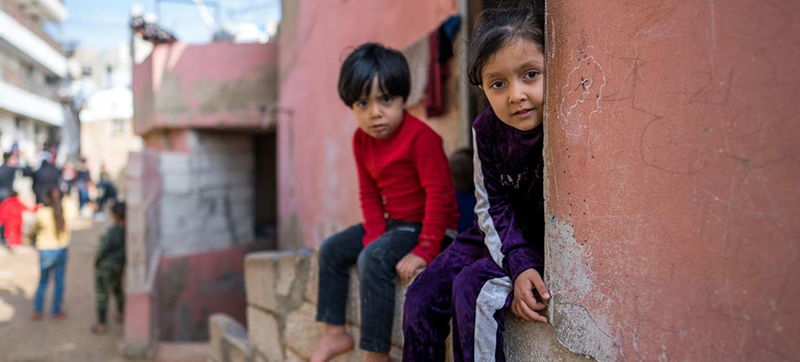 Gaza
Gaza
Gaza war spillover compounds misery for most vulnerable in Lebanon
Children as young as four are being forced to go to work in Lebanon amid a “massive collapse” in humanitarian funding and escalating hostilities on the country’s southern border with Israel that threaten to spiral into a “full-scale war”, UN child experts said on Tuesday.
In a call for an immediate end to the war in Gaza which sparked intensifying exchanges of fire between armed militants Hezbollah and the Israeli military, the UN Children’s Fund (UNICEF) warned that airstrikes are hitting “deeper and deeper” into Lebanon, with 344 people killed to date, including eight youngsters.
“Together with those killed and the scores who have been injured, 30,000 children have now been displaced” out of some 90,000 since Hezbollah fighters stepped up strikes targeting northern Israel following Hamas-led terror attacks on southern Israel on 7 October and Israel’s subsequent intense bombardment of the Gaza Strip, said UNICEF spokesperson James Elder.
“Even with our greatest efforts, a permanent ceasefire is essential,” Mr. Elder insisted. “Without that ceasefire, Lebanon is at risk of a full-scale war, which will be utterly devastating for the country's 1.3 million children as well as well, of course, for the region's children.”
Inside Lebanon, the UN official reported that key water station infrastructure has been destroyed, leaving “around 100,000 people now denied access to clean drinking water”. Around 23 health facilities serving 4,000 people are also closed as a result of the violence.
Entire families sent out to beg
In a sign of the deteriorating humanitarian situation in Lebanon linked to the crisis, the UN agency warned that new food insecurity data indicated that rates of wasting were found to be unexpectedly high among children living in informal tented settlements for the displaced.
“We had indications that the crisis was getting worse in terms of nutrition because we have seen a three-fold increase to children being referred to our malnutrition programmes over the past 12 months,” said Ettie Higgins, UNICEF Lebanon deputy head of office. “And these are now programmes that in some cases were suspended in parts of the country because of the lack of humanitarian funding.”
As a result, communities are now “sending the entire family out for begging; they're forcing children as young as four to work in agriculture…I spoke to a doctor recently who said that he had seven-year-olds coming to him with back problems because of the heavy loads of trash that they’re carrying on a daily basis.”
The UNICEF officer noted that children could expect to earn “maybe $2 per day, just to be able to eat and put a meal on the table. So, these stories unfortunately are getting more and more frequent and more and more severe and tragic.”
Displaced have lost everything - again
Even before the latest hostilities, Lebanon faced a deep economic crisis – made worse by the COVID-19 emergency and chronic political instability – which has left around half the Lebanese population living below the poverty line.
Even more vulnerable are the one million-strong Syrian refugee population, nine in 10 of whom live in “extreme poverty”, according to the UNICEF report on the crisis, Caught in the Crossfire: The impact of six months of conflict on children in Lebanon.
The majority of those now displaced in the south of the country are Lebanese, and many who work in farming and olive growing have lost their livelihoods for a second time, explained Ms. Higgins.
“We've been supporting families…to get back on their feet since the economic crisis began three or four years ago, since 2019, and they have again lost everything,” she told journalists in Geneva via videolink from Beirut.
“Many who have been working in agriculture, such as in olive farms, have also been destroyed, and even if they were able to go back, even tomorrow, the type of suffering that they're subject to is going to be long-term because of the huge amount of unexploded ordnance that is now in many of these agricultural areas, meaning that it would be very, very difficult for them to re-establish themselves.”
Funding collapse
Amid growing needs and a spike in tensions between Lebanese and Syrian refugee communities, which could be defused with prompt humanitarian action, the UNICEF officer warned that a number of donor countries had “significantly reduced” critical funding.
“We are facing a massive collapse in humanitarian funding over the past three months, four months in Lebanon,” Ms. Higgins said. “This has forced us to cut back virtually all of our services, including the provision of safe drinking water and simple things like getting rid of sewage from communities that are already overburdened.”
Syria influx
Following the outbreak of the Syria crisis in 2011, many Lebanese villages that are now reeling from the hostilities welcomed more than a million refugees “into their schools, their clinics, their, their communities”, the UNICEF officer continued.
Today, “we are seeing tensions really spike and having an impact on children on a daily basis,” she continued, noting the high level of trauma displayed by Palestinian refugees now living in “terrible conditions in the camps here” while also suffering the “secondary trauma” of seeing what is happening to fellow Palestinians in Gaza.
Support Our Journalism
We cannot do without you.. your contribution supports unbiased journalism
IBNS is not driven by any ism- not wokeism, not racism, not skewed secularism, not hyper right-wing or left liberal ideals, nor by any hardline religious beliefs or hyper nationalism. We want to serve you good old objective news, as they are. We do not judge or preach. We let people decide for themselves. We only try to present factual and well-sourced news.





